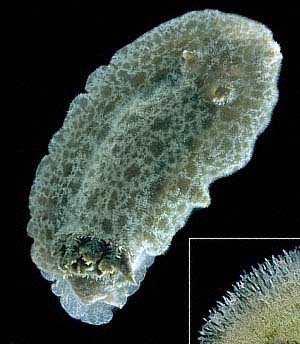
Jorunna pantherina
(Angas, 1864)
Order: NUDIBRANCHIA
Suborder: DORIDINA
Family: Dorididae
DISTRIBUTION
described from New South Wales, eastern Australia, but probably widely distributed throughout the Indo-West Pacific.
PHOTO
Two-fold Bay, New South Wales, March 1986. Inset showing magnified view of mantle edge to show closely packed spiculate papillae called "caryophyllidia'. Grows to about 25 mm. PHOTO: Bill Rudman.
This species probably includes a number of colour forms from translucent straw colour to deep brown. In all cases the darker patches are present. A purple species of Jorunna which is also common in New South Wales, is almost certainly a separate species.
Reference:
• Angas, G.F. (1864). Description d'espèces nouvelles appartenant à plusieurs genres de Mollusques Nudibranches des environs de Port-Jackson (Nouvelles-Galles du Sud), accompagnée de dessins faits d'après nature. Journal de Conchyliologie, 12: 43-70.
Rudman, W.B., 1999 (January 6) Jorunna pantherina (Angas, 1864). [In] Sea Slug Forum. Australian Museum, Sydney. Available from http://www.seaslugforum.net/find/jorupant
Related messages
Jorunna pantherina from Sydney
April 11, 2007
From: Michael Clarke

Hi Bill,
We found this little one while exploring rock pools at Le Perouse.
We believe it is from the Atagema family but have looked through your list and can't fine one that is green. Could it be a local colour variation of the Atagema albata?
Locality: Rock Pool, On land, Australia, Pacific, 01 April 2007, Rock Pool . Length: 1 inch. Photographer: Michael Clarke.
We also noticed after taking the photos that it has eggs.
Thanks for your help.
Laura & Michael
michael.clarke@pfizer.com
Clarke, M.W., 2007 (Apr 11) Jorunna pantherina from Sydney. [Message in] Sea Slug Forum. Australian Museum, Sydney. Available from http://www.seaslugforum.net/find/19806
Dear Michael,
Do you mean Atagema osseosa ? There are a number of dorid groups with a bristly mantle like this. Your animal is Jorunna pantherina. Species of Jorunna have a much softer skin than species of Atagema. Looking at your photo, it looks like your animal has a bit of skin partly detached at the front, which would support my Jorunna identification - although I wouldn't recommend the technique as a regular means of identification.
As you will see on the Fact Sheet and associated messages, Jorunna pantherina is quite variable in colour and a good match with the sponges it is found on.
Best wishes,
Bill Rudman
Jorunna pantherina? from Sagami Bay, Japan.
May 29, 2002
From: Jun Imamoto

Dear Bill.
This sea slug is from Shimoda, Izu Peninsula(Sagami-Bay), Japan. They were in very shallow tide-pool.
Date: 25 Nov 2001
Place: Shimoda,Izu Peninsula (Sagami Bay), Japan
Depth: Intertidal (3cm)
Size: about 30mm (upper right, lower left)
Size: about 20mm (lower right)
Water temperature: 19C degrees.
Best Regards,
Jun Imamoto
imamoto@wips.co.jp


Dear Jun,
I suspect this is Jorunna pantherina, which was originally described from Sydney Harbour 140 years ago. I suspect it has a wide distribution throughout the Indo=West Pacific
Best wishes,
Bill Rudman.
Jorunna from Port Stephens
May 29, 2000
From: Ron Greer

Dear Bill,
Late last year I sent you a couple of images for ID that you confirmed as Petalifera ramosa. That week of diving was the most prolific I had seen in 10 years at Fly Point [Port Stephens, New South Wales, Australia]. Of the 25+ species I saw were 5 that I have been unable to ID. Here is one of them. I hope you can ID for me.
Regards,
Ron
Ron Greer
diveimage@i-o.net.au
diveimage@i-o.net.au
Greer, R., 2000 (May 29) Jorunna from Port Stephens. [Message in] Sea Slug Forum. Australian Museum, Sydney. Available from http://www.seaslugforum.net/find/2464Dear Ron,
This is a pale form of Jorunna pantherina which ranges in colour form this almost colourless form through shades of yellow, brown, grey and green.
Best wishes,
Bill Rudman.
Jorunna pantherina from Queensland
January 6, 1999
From: Wayne Ellis

Hi Bill,
Any ideas on this image? The slug was found at Port Cartwright, southeastern Queensland, 5th October, 1998, intertidal, under a rock on yellow sponge with tightly coiled egg mass.
Regards,
Wayne
glaskin@ozemail.com.au
Ellis, W., 1999 (Jan 6) Jorunna pantherina from Queensland. [Message in] Sea Slug Forum. Australian Museum, Sydney. Available from http://www.seaslugforum.net/find/445I think this is Jorunna pantherina. Although the "typical" colour form is greenish, as photographed at top of the page, this species tends to take on the colour of the sponge it feeds on, probably like Rostanga it takes up some of the pigments.
Bill Rudman.
